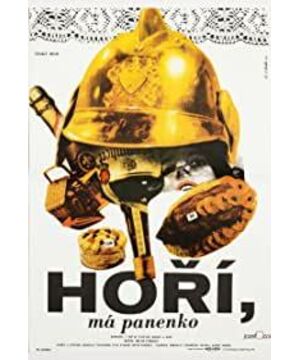In 1967, "The Firemen's Ball" was filmed, with a length of 71 minutes. When the climax of ordinary movies just appeared, "Disappearance" has come to an abrupt end. 71 minutes of film, small climaxes one after the other: the poster of the ball catches fire; Joseph, a member of the fire committee, discovers that his wife has stolen the sausage as a prize; the big nose beauty pageant takes off her dress to reveal her fleshy figure; the girl They were reluctant to go on stage for a beauty pageant, and everyone coaxed to choose a fat old lady; The real climax was when everyone came back from the fire and found that all the prizes were gone. The head of the committee came out and expressed his willingness to give everyone a chance to ask the thief to return the prize to its original place when the lights were turned off. Joseph carried the head sausage that his wife had stolen and put it back on the prize table. At this time, the light flashed on. In front of everyone's eyes, Joseph threw his sausage and fainted.
"Stealing" or "taking" is a theme of "Xiao". As soon as the movie begins, Joseph realizes that a cake is missing from the prize. He let his wife look at the prize, and soon discovered that the champagne and sausages were missing. Joseph's wife was by no means the only one who stole the prize. A table full of prizes was eventually looted. Joseph, who has been guarding the prize from beginning to end, has become the target of public criticism for returning the things his wife stole. There was chaos in the committee, and A cursed, Joseph, you old idiot, why do you want to return it. B said, if you are in such a situation, you will also pay it back because you are honest. A shouted, "Never, and under such circumstances, should never be paid! You remember me! For me, the firefighter's reputation is more important than honesty!"
In a later interview, Foreman stated that this line is the spirit of the film. Many people say the film is an allegory of communism. "Crazy" annoyed the Communists in Czechoslovakia, and Foreman fled to the United States. After that, his films began to have male and female protagonists, heroic characters and individualism. In the later films, the collectivist chaos in "Crazy" disappears, there is no farcical scene where a group of firefighters can't put out the fire twice, and no ugly girls come out to participate in beauty pageants. Foreman's later films noticeably pick up the pace and begin to Hollywood. He brings brilliant characters, telling the story of one person instead of telling the story of a group of people. But I still miss Foreman's early films, the warmth of humanity and the real chaos in them.
The old man whose house was on fire was wearing white pajamas, his nose was red from freezing, and his face was black and gray, standing in the snow, watching his house devoured by the fire little by little. The good-hearted people watching on the side brought him a stool and let him sit down. Later, everyone was afraid that he would be too sad and asked him to sit with his back to the flames, but the old man still looked back unwillingly. Everyone was afraid that he would be cold, so they decided to move the stool closer to the flame. Warming up with the flames burning one's own house, yet full of humanity, this kind of comedy is special.
View more about The Firemen's Ball reviews








